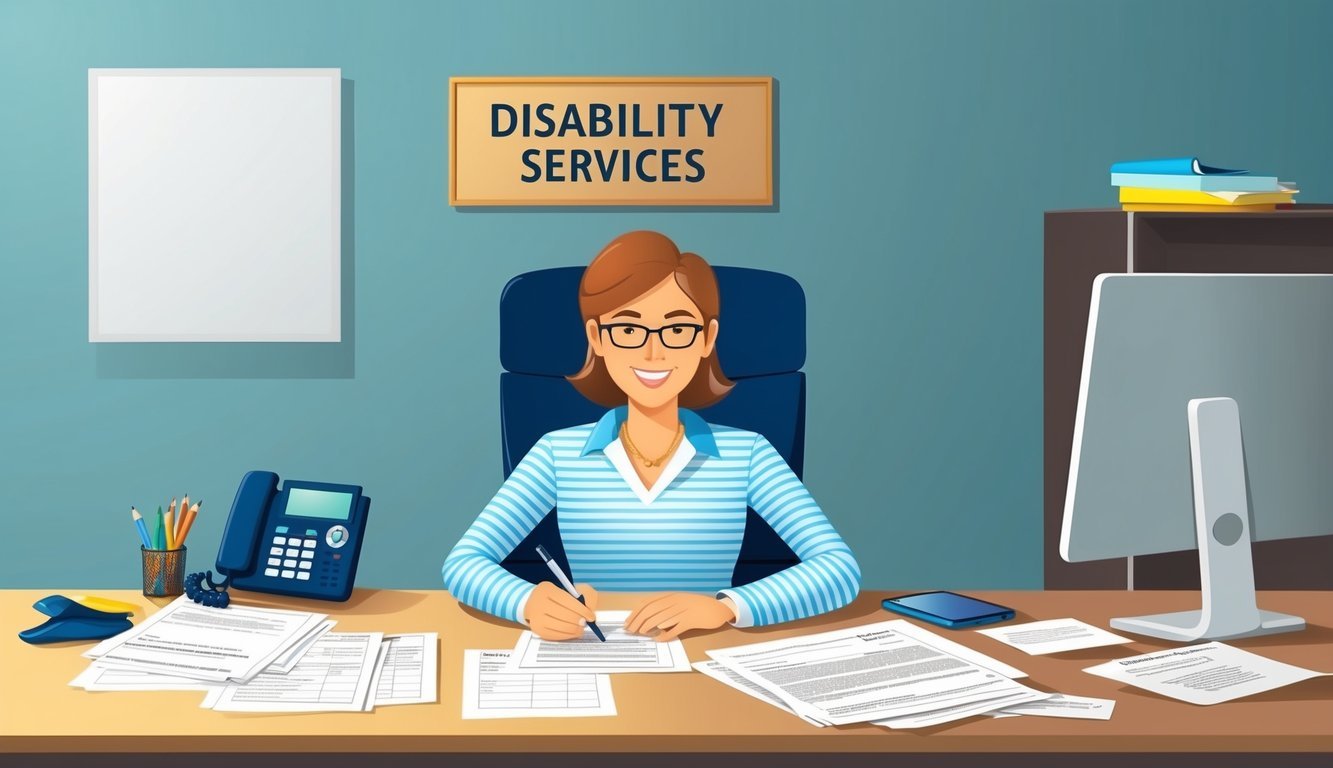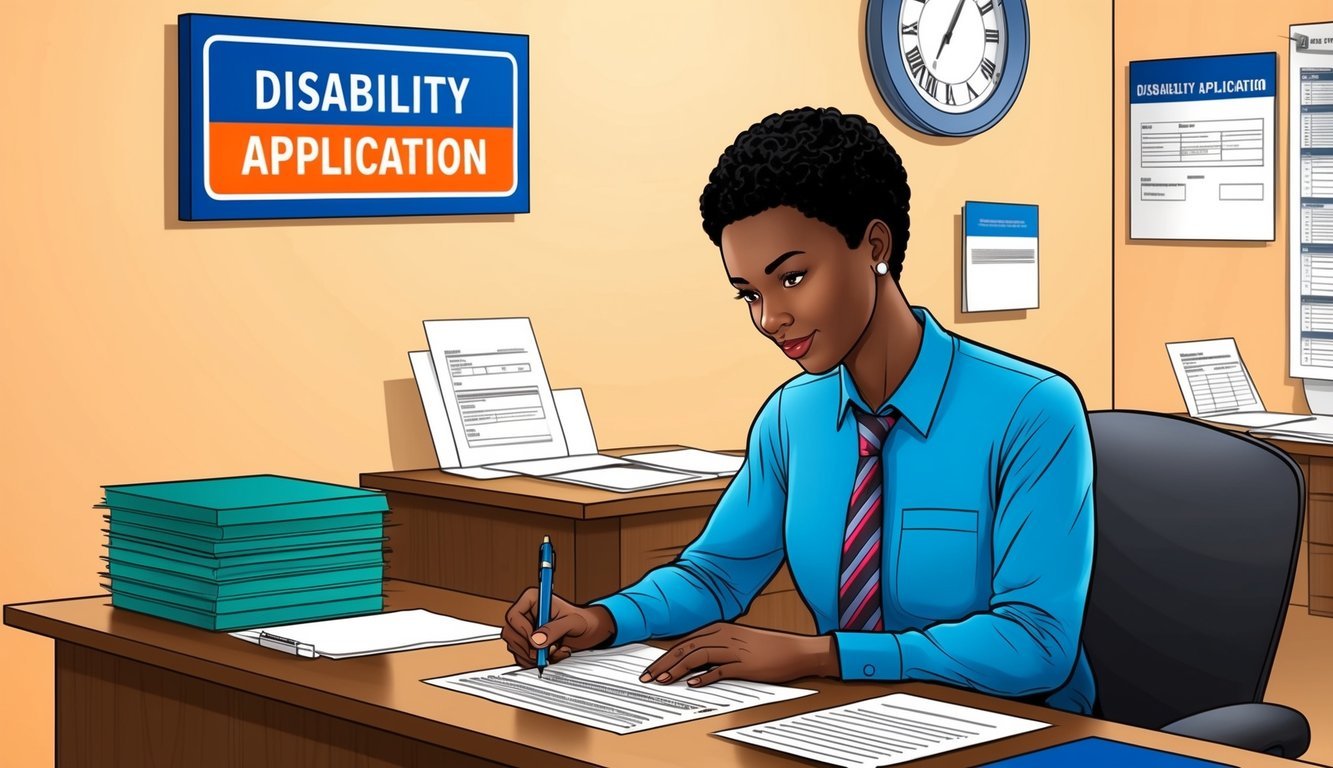## Considering Disability Benefits in Alabama? Here’s What You Need to Know!
Thinking about applying for disability benefits in Alabama? You’re not alone—many people find themselves needing a little support when health issues make working difficult.
The good news? Getting started isn’t as tough as it might seem.

You can **apply for disability benefits** online, over the phone, or even in person at your local Social Security office.
Sure, it takes a little time, but trust me, it’s worth it if you’re eligible.
Gather up your medical records, work history, and all those little documents that help tell your story.
Now, I get it—the waiting can feel like torture.
But don’t let it get you down! Use this time to focus on your well-being and keep your spirits up.
Many folks find it comforting to connect with others going through the same experience.
### Key Takeaways
– **Applying Methods:** You can apply online, by phone, or in person at a Social Security office.
– **Document Prep:** Have all necessary medical and work documents at the ready before you dive into the application.
– **Patience is Key:** Expect a waiting period, and try to stay patient throughout the process.
## Navigating the Eligibility and Application Process
Getting disability benefits in Alabama means jumping through a few hoops to meet specific eligibility criteria.
It can feel a bit overwhelming, but you’re not alone in this! Start by gathering your medical records and documents to support your claim.
Understand **how to apply for disability** can make a world of difference in ensuring you don’t trip up along the way.
A well-prepared application is your best bet for getting approved.
### Determining Eligibility
To qualify for disability benefits in Alabama, you’ll need a medical condition that keeps you from working for at least a year.
The Social Security Administration (SSA) will take a good look at your work history and how much you’ve paid into Social Security.
Don’t forget—they’ll also consider if you can do any type of work.
You’ll need to demonstrate that your condition is serious enough to impact your ability to work.
This means presenting detailed medical records and proof of ongoing treatment.
The SSA reviews your case to determine if you meet their standards for disability.
Just having a diagnosis? That won’t cut it! You’ll need to show how your condition affects your daily life and work capabilities.
### Gathering Your Documents
When it comes to your disability application, paperwork is king.
You’ll need to gather your Social Security number, birth certificate, and medical records.
Not sure what else to include? Here’s a handy list to get you started:
– Medical records from all your healthcare providers.
– Test results and lab reports.
– A list of all medications you take.
– W-2 forms or self-employment tax returns.
– Names and dates of jobs you’ve had.
The more evidence you can provide, the stronger your case will be! And don’t overlook any treatments you’ve tried—good, bad, or otherwise.
### Filing the Disability Claim
Ready to file your claim? You have a few options.
You can **apply online**, which is often the most straightforward method.
If you’d rather talk to someone, go ahead and call or swing by your local Social Security office.
When you sit down to fill out the application, have all your documents close by.
The application will ask about your medical condition, work history, and how your disability impacts your daily life.
If you can’t finish it all in one go, don’t sweat it.
You can save your progress and come back later.
Once you submit your claim, you can check the status online or over the phone.
Remember, all good things take time, so keep your chin up and follow up if you don’t hear back in a while.
## After You Apply

Once you’ve submitted your disability application in Alabama, there’s a specific path to follow.
You’ll want to stay organized and be ready for anything.
### Understanding the Review Process
After you submit your application, the SSA checks to see if you meet the basic requirements.
They look into your work history and what you’re currently doing.
If you qualify, your case gets forwarded to Disability Determination Services (DDS) in Alabama.
DDS will take a close look at your medical records.
They might ask you to undergo additional tests, which can take time—expect a few months of waiting.
You can keep tabs on your application’s status online or by calling.
The DDS assesses whether you’re considered disabled by Social Security’s standards.
They’ll factor in your health, age, education, and work history.
If they need more details, they’ll reach out to you.
### What If You Get Denied?
Getting denied at first happens more often than you’d think.
Don’t throw in the towel! You’ve got options.
You can appeal within 60 days, and the first step is to request a reconsideration.
A new person will review your case.
If you get denied again, you can ask for a hearing with an administrative law judge.
This is your chance to explain your situation face-to-face.
You might want to think about getting a disability attorney by this stage—they know the ropes and can help you showcase your case effectively.
And don’t forget, support groups can be a fantastic resource during this trying time.
### Support and Resources
You’re not alone in this! Alabama offers plenty of resources to help navigate the process.
The [Alabama Department of Rehabilitation Services](https://www.rehab.alabama.gov/) provides vocational rehab services—they’re there to help you find work if you’re able.
Local Social Security offices are also available to answer any questions about your claim.
They have folks who can help if you’re deaf or hard of hearing.
Plus, there are also specific groups out there for various conditions.
They can provide valuable information about any special rules that might apply to you.
Don’t hesitate to reach out for help; this process can be tough, but many understand your struggle.
## Frequently Asked Questions

Disability benefits in Alabama can be a bit tricky to navigate.
Here are some common questions that might help clear things up:
### What Conditions Are Eligible for Disability Benefits?
A lot of health issues can qualify you for disability benefits.
The SSA will look at how your condition hinders your ability to work.
Both mental and physical impairments lasting at least a year might qualify.
Think severe back problems, heart disease, or bipolar disorder.
### How Do I Apply for Expedited Disability Assistance?
If you have a serious condition, you can request faster processing.
Applying in person at your local Social Security office might help speed things up.
Bring any medical records that highlight your urgent need.
The SSA has specific programs for terminal illnesses and wounded veterans, too.
### What’s the Procedure for Temporary Disability Benefits?
Alabama doesn’t offer state temporary disability benefits.
However, you might qualify for short-term private insurance through your employer.
Federal Social Security Disability Insurance (SSDI) is another option, but keep in mind it requires your condition to last at least a year.
### What Paperwork Do I Need When Filing for Social Security Disability?
Gather all your medical records, work history, and personal info.
This includes doctor reports, test results, and lists of medications.
Don’t forget your Social Security number, birth certificate, and recent tax forms or pay stubs.
### How Can I Fill Out the Disability Application Form Online?
The SSA has a handy [online application on their website](https://www.atticus.com/advice/general/alabama-disability-benefits).
You’ll create an account and answer questions about your health and work history.
The form even lets you save your progress and come back to it later.
Plus, you can upload medical documents to support your claim.
### Are There Specific Disabilities That Get Approved More Often Than Others?
Some conditions have clearer paths to approval, like certain cancers, organ transplants, and ALS.
Mental health disorders such as severe depression or schizophrenia can also qualify.
But remember, SSA is mainly interested in how your condition affects your work ability—not just the diagnosis itself.
Navigating the disability application can be a rollercoaster ride, but with the right mindset and preparation, you can make the journey a little smoother.
Trust in your ability to navigate this process, and take things one step at a time!

